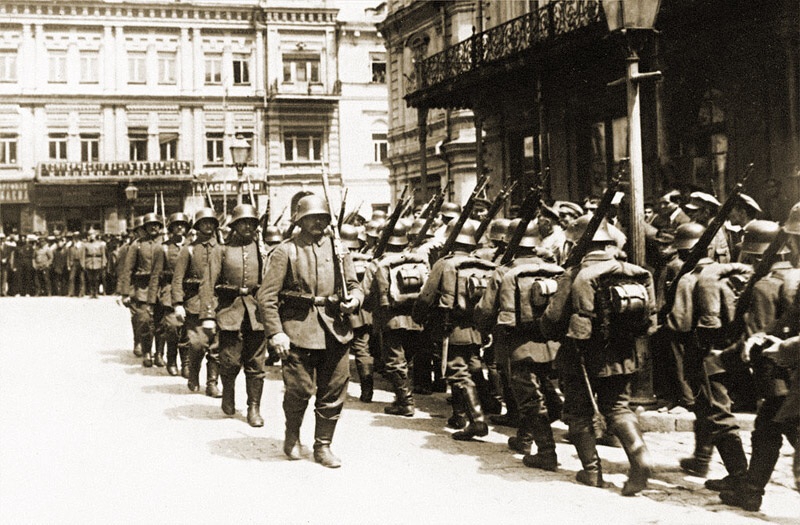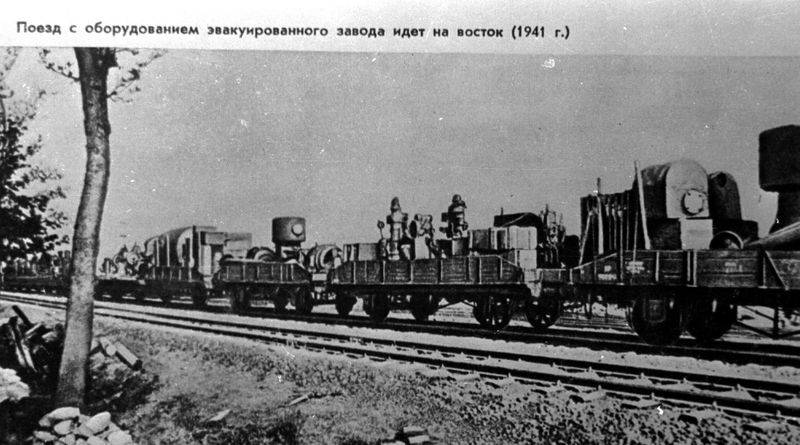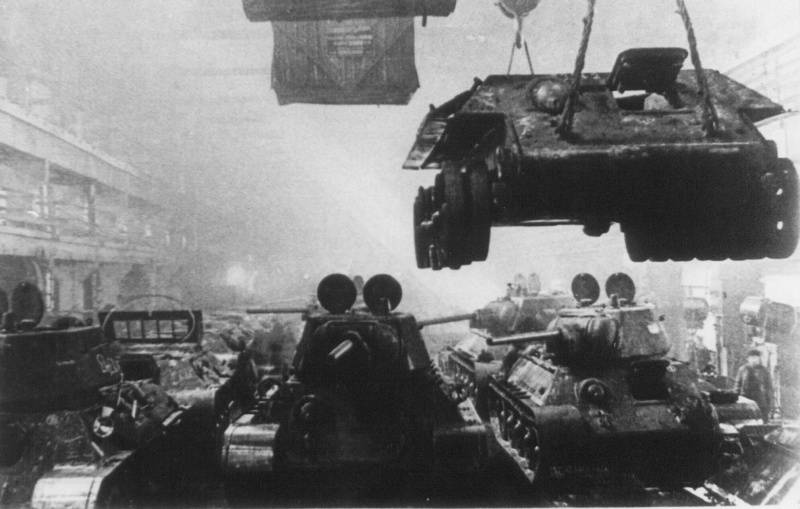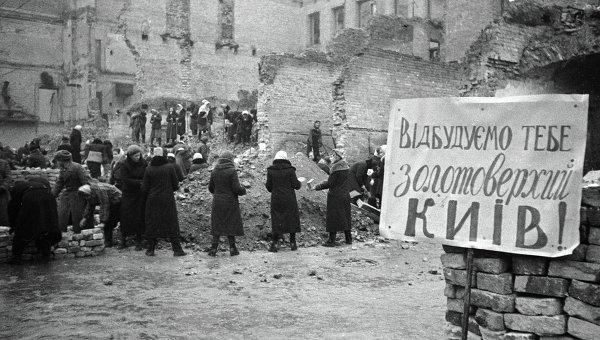Behind enemy lines his name was: “Comrade Demyan”
Nationalist Ukraine at the official level ignored the Day of Partisan Glory in September. She also kept silent about the name of party and Soviet leader Demyan Korotchenko, one of the leaders of the partisan and underground struggle in the territory temporarily occupied by the Nazis.
Subscribe to PolitNavigator news at Telegram, Facebook, Classmates or In contact with
He was born in the remote village of Pogrebki, Novgorod-Seversky district, on November 29, 1894, into a large family. It is difficult to say what the guy’s fate would have been like if his older comrades had not awakened in him an interest in the events taking place and participation in the revolutionary movement.
In Tallinn, and then he was called Revel, the “lower rank” of the fifth battery of one of the coastal artillery brigades, Demyan Korotchenko, went through such a school of class education, after which there were no longer two answers left for him to the question: “Who should he turn his weapon against?” After the February Revolution, a reasonable and restrained junior fireworker-laborist who enjoys the authority is elected a member of the soldiers' committee and chairman of the regimental court.
He persistently campaigns among soldiers. Just yesterday, the quiet Polesie, clogged with need and war, was seething, asking a question burning like heat: “How to live further?” A man in a soldier's overcoat, with a high forehead and an open face gives the only correct answer to him: to go with the Bolsheviks. Demyan plunges headlong into the fight. Here, at the border between Ukraine and Russia, it was especially fierce. Creates a committee of the poor in his native Cellars. Takes part in the work of the Novgorod-Seversky District Congress of Peasants and the District Congress of Soviets, which unconditionally supported the decisions of the First Ukrainian Congress of Soviets and proclaimed Soviet power. The delegate of two congresses from the Ivotskaya volost was Demyan Sergeevich Korotchenko.
But the enemy fiercely resists revolutionary changes, including the confiscation of landowners' lands. They listen to Demyan in his native village, and not only in Pogrebki. At his suggestion, a Red Guard detachment is created, the commander of which is elected Demyan Korotchenko.
The Central Rada, losing trust and support among the people, surrenders Ukraine to the Kaiser’s occupiers. Anticipating the approaching help, the counter-revolutionary rump raises its head. And the gunpowder factory accumulated huge reserves of gunpowder, pyroxylin, and military equipment. They could fall into the hands of the enemy. From the gunpowder factory, literally from under the very nose of the Kaiser’s hordes, the patriots, led by Demyan, took out 40 thousand pounds of gunpowder for the needs of the Red Army, and evacuated 35 wagons of other equipment.
There were many such daring operations on the account of the fighters led by Demyan Korotchenko. Along the Desna River, from Novgorod-Seversk to Chernigov, despite wartime, the steamboat Svitanok cruised peacefully. But then the Haidamaks settled on it and fired machine guns at the peasants working in the meadows, including women and children. The commander of the future regiment of the Shchorsovsky division, Vasily Bozhenko, supported Demyan Korotchenko in his intention to teach the Blue Zhupans a lesson.

Vasily Bozhenko
Before dawn, thirteen brave men, led by a commander, settled down in the thickets of reeds and coastal willow. A ship appeared. The helmsman turns the helm to the left, intending to head into the channel along the route planned by the Haidamaks.
“Hey, on the ship, follow the main channel of the Desna,” Korotchenko commanded loudly.
The captain tried to disobey, but the partisan Lewis gun fired loudly, and bullets whistled over his head. “Svitanok” helplessly stuck its nose into the sandy shore. The attack was so swift that the Haidamaks, without having time to come to their senses, were captured. On the ship, in addition to weapons, there was a lot of explosives and military equipment.

Kyiv, 1918. Occupation troops of the Kaiser’s Germany on Duma Square (now Maidan of Independence).
According to the plans of the Kaiser's occupiers, the so-called neutral zone formed between Russia and Ukraine was supposed to isolate German units from the revolutionary influence of Soviet Russia. But the occupiers miscalculated. It was the neutral zone, the unconquered eastern territories, that became the place for the formation of rebel regiments and formations. Here they accumulated strength and prepared for future battles for the liberation of Ukraine. All attempts by the occupiers and lackeys of Hetman Skoropadsky to liquidate the red “neutral zone” failed.
Then Demyan Korotchenko could not, of course, predict that a little more than two decades would pass and it was this part of the Sumy, Chernigov, Zhitomir, Bryansk regions that would become the support base of the partisan movement of Ukraine during the Great Patriotic War. Much of the experience of the Civil War partisans will be in demand. Including the experience of river battles, when Kovpakov partisans managed to sink an enemy flotilla on the Pripyat River with sudden artillery fire.
It was necessary to build a new life, or rather, to raise the economy from ruins, under the most difficult conditions. By the will of fate, the hero of our story found himself at the forefront of solving this problem. Already at the end of 1921, he was elected secretary of the Shostka district committee of the CP(b)U. A new countdown of the biography of the communist Demyan Korotchenko began in 1918. Party work and work in government bodies from now on became his main calling.
Of course, I lacked experience. But what helped was that they knew him and respected him like no one else. That he knew any path, any copse in each of the six volosts that make up the Shostkinsky district like the back of his hand, from the days of his partisan youth. However, then, in the early 20s, the secretary of the committee, who had only recently been elected to his first responsible leadership post, turned 27. They grew up quickly then, tempering themselves and gaining experience in creative affairs.
In Shostka, one of the centers of the future chemical industry of Soviet Ukraine, a vocational school, a chemical technical school, and with it a workers' department, one of the first ten organized at that time in the republic, were opened. Soon they will be joined by an industrial technical school, a three-year workers' university, classes in which district party and Soviet workers consider it their duty to attend. The secretary of the party committee also studies there.
The beginning of the first five-year plan coincided with Demyan Sergeevich’s departure to study in Moscow. It was the capital of the USSR that armed him not only with modern knowledge, but also with the ability to solve more complex problems of economic and cultural construction in the posts of chairman of the executive committee of the Baumansky District Council of Workers' Deputies, and then - the first secretary of the district party committee.
Baumansky district was one of the largest districts of Moscow. More than 360 thousand people lived here, and the same number came daily from the Moscow region. More than 4000 enterprises, organizations, research institutes and educational institutions. In this huge administrative formation, even by today’s standards, Korotchenko acquired an important character trait: to complete any work he started, to involve party and Soviet activists in solving every problem, to rely on people, to find support and support in them. He did not change the developed style, no matter where fate took him - in the Moscow region, Smolensk...
And again Ukraine. Only the post is larger and more responsible. In November 1937, D. S. Korotchenko was elected first secretary of the Dnepropetrovsk regional committee of the Communist Party of Ukraine (Bolsheviks). Here he puts forward a strategic task - to turn the region into a leading one not only in industrial, but also in agricultural production. Speaking at one of the meetings with voters as a candidate for deputy of the Supreme Soviet of the USSR, he will say: “The working class raised me, the party made me a statesman. It is my duty as a Bolshevik to honorably fulfill all the tasks assigned to me..."
The Great Patriotic War became a severe test for the people of Soviet Ukraine. The Central Committee of the Communist Party (b)U worked day and night, which, according to D.S. Korotchenko, from the very beginning of the war turned into a combat headquarters to mobilize the material and spiritual forces of the Ukrainian people to defeat the hated enemy.
The Secretary of the Central Committee could be seen not only at the construction of defensive lines. It was necessary, sometimes under the nose of the advancing enemy, to ensure the transfer of industrial potential to the east.

In the most difficult wartime conditions, 550 large enterprises, hundreds of collective and state farms, MTS, scientific and educational institutions, cultural assets were relocated to the deep rear of the Soviet country, and millions of Ukrainian residents were evacuated.
Suffice it to say that 25 thousand railway cars were needed to evacuate enterprises and institutions in Kyiv and Kharkov alone. But there were also Zaporozhye, Stalino, Dnepropetrovsk, Lugansk.
“History has never known such a movement of productive forces,” Korotchenko will write after the war in his memoirs on the pages of the newspaper “Evening Kyiv.”

Assembly of T-34-76 tanks in Nizhny Tagil. The tanks were produced at the Ural Carriage Works and at Factory No. 183, evacuated here from Kharkov, 1943.
Together with other members of the Politburo and secretaries of the Central Committee of the CP(b)U, first secretaries of regional party committees, the main burden of work on organizing the party underground and partisan movement in the territory occupied by the fascists fell on his shoulders. At the direction of the Central Committee, special partisan schools and short-term courses were organized in Kiev, Kharkov, Chernigov, Voroshilovgrad, Poltava, Sumy and other cities, where future partisan commanders, messengers, demolition saboteurs, and mine instructors were trained. Many graduates of these schools and courses subsequently became talented organizers of the fight behind enemy lines, commanders and commissars of partisan detachments, formations and sabotage groups.
In the shortest possible time, 23 regional, 685 city and district underground party committees were formed, 883 partisan detachments and over 1700 sabotage and extermination groups, about 40 thousand communists, were sent to work behind enemy lines.
Not everyone was lucky enough to survive under the brutal occupation regime. There was a lack of experience, the ability to carefully observe secrecy, and most importantly, reliable communication. It was for this purpose that an institute of experienced organizers and liaison officers of the Central Committee was created. D.S. Korotchenko talked for a long time with those who went to the enemy rear, risking each time not to return, giving fatherly advice, instructions, giving specific tasks and instructions, and advising on how best to conduct illegal work on the ground. Only in the autumn of 1942 - winter of 1943, 200 authorized representatives of the Central Committee, secretaries of underground party committees and party organizers were transported behind enemy lines, behind the front line.
In June 1942, the Ukrainian Headquarters of the Partisan Movement (USHPD) was created, headed by the Deputy People's Commissar of Internal Affairs of the Republic Timofey Strokach. The headquarters was a military organ of the Central Committee of the Communist Party of Ukraine (Bolsheviks) and worked under its leadership. In October 1942, the illegal Central Committee of the Communist Party of Ukraine (Bolsheviks) was created, which included D. S. Korotchenko, L. R. Kornietz, M. S. Grechukha, T. A. Strokach, as well as commanders and commissars of partisan formations. A. Kovpak, S. V. Rudnev, A. F. Fedorov, A. N. Saburov, V. A. Begma, P. H. Kumanek and others. At the same time, the illegal Central Committee outlined a specific program of activity for party organizations to strengthen and expand the underground and partisan struggle in Ukraine.
With the defeat of fascist troops at Stalingrad and the beginning of the liberation of enemy-occupied territories by the Soviet Army, the center of partisan warfare moved to the Right Bank of Ukraine, where in the spring of 1943 19 large formations and more than 150 partisan detachments and groups operated. To provide direct assistance to underground party and Komsomol organizations, partisan detachments, the Central Committee of the Communist Party of Ukraine sent the Secretary of the Central Committee of the Communist Party of Ukraine (Bolsheviks) D.S. Korotchenko with a group of employees of the apparatus of the Central Committee of the Party and the Central Committee of the Komsomol of Ukraine to the deep rear of the enemy.
“The arrival of the secretary of the Central Committee of the party and a member of the government was a great event for us partisans,” G. Ya. Bazima, chief of staff of the Kovpak-Rudnev formation, recalled this. “We felt even more strongly our connection with the Motherland, with our party, we felt its leadership and care for us.”
Demyan Sergeevich was interested not only in the command’s ability to lead the formation, which by that time numbered more than 1500 fighters, but, above all, in the moral and political situation, the state of party and Komsomol work. The speeches of the Secretary of the Central Committee to party activists and among partisans about the state of affairs on the mainland, about the prospects for the offensive of the Soviet Army and the complete liberation of Ukraine were a huge success and gave new strength to the fighters. Not everyone, of course, knew that a member of the top political leadership of the Communist Party of Ukraine was communicating with them; for the purpose of secrecy, he was presented as Comrade Demyan from the mainland. With this nickname he will forever go down in the history of the partisan movement during the Great Patriotic War.
Preparing for a new campaign, S.A. Kovpak’s unit tried to hold in its hands for as long as possible the partisan airfield near the village of Kozhushki, where Soviet planes delivered weapons, ammunition and everything necessary from the mainland. The fascist command concentrated about two divisions, tanks, and artillery in this area, hoping to defeat and sink the formation in Pripyat. For this operation, the boastful German generals chose the code name “Wet Bag”.
The partisans had a different task. If not repelled, then hold back the onslaught of many times superior enemy forces, cross the Pripyat and slip out of the trap prepared by the punitive forces.
The detachments under the command of S.V. Rudnev, near the Belarusian village of Arevichi, had to repel five fierce enemy attacks. Next to them in the battle formation was “Comrade Demyan.” The presence of the envoy from the mainland inspired the fighters. That day Demyan Sergeevich had to visit another hot spot - the construction of a crossing. Picking up people, getting into the cold water yourself more than once, knitting rafts. Soon the crossing was ready, and the Nazis were once again left with nothing to show for it.
At the end of May, in the partisan region, near the village of Kartenichi, a meeting of members of the illegal Central Committee of the Communist Party of Ukraine (Bolsheviks) and the command and political staff of the nine largest partisan formations in Ukraine was convened by D.S. Korotchenko. At the meeting, the results of the combat activities of the partisan detachments were reviewed, a program was outlined to intensify their struggle for the summer period, and a unified structure of party bodies was developed for all formations of the people's avengers. The meeting became a genuine school for exchanging experiences in partisan warfare and political work behind enemy lines.

Commanders of Soviet partisan formations (from right to left) Timofey Amvrosievich Strokach (1903-1963), Semyon Vasilyevich Rudnev (1899-1943), Alexey Fedorovich Fedorov (1901-1989) and Secretary of the Central Committee of the Communist Party (b)U Demyan Sergeevich Korotchenko (1894-1969) .
At the beginning of June, the head of the Ukrainian headquarters of the partisan movement, T. A. Strokach, arrived in the partisan region together with a group of operative workers. For a month, he and “Comrade Demyan” toured the largest formations and detachments, checked their readiness for raids into Western Ukraine, and provided practical assistance. On behalf of the government of the republic, for their courage and valor, they presented the fighters and commanders with the “Partisan of the Patriotic War” medals. T. A. Strokach attached the same medal to Demyan Sergeevich’s chest before the formation of Kovpakov partisans.

The chief of the Ukrainian headquarters of the partisan movement, Major General Strokach, presents government awards to the partisans. On the left are S. A. Kovpak and D. S. Korotchenko.
Here, in impenetrable forests, far from his native Pogrebki, he had a joyful meeting with his brother Fyodor Sergeevich, before the fascist occupation, the chairman of the Shostka district executive committee, who actively worked in the party underground in his native place, miraculously escaped the Gestapo trap, and now fought as deputy detachment commander in connection of A. N. Saburov. The meeting was joyful and exciting, because Fyodor and Demyan had not seen each other for almost two years. We remembered other brothers - on behalf of the USHPR, Peter, who was sent to the Rivne region and commanded a partisan unit there, as well as Stepan and Leonid, who fought in the active army. Each of them fought in the position that fate entrusted, and fulfilled their duty to the Motherland with dignity.
The Politburo of the Central Committee of the Communist Party (b)U highly appreciated the actions of D. S. Korotchenko on Soviet territory temporarily occupied by the enemy. This was confirmed by awarding him the second Order of Lenin and the Order of Suvorov.
But there was no need to rest on our laurels. The decisive battle for the complete liberation of Soviet Ukraine from the Nazi invaders began. The Secretary of the Central Committee of the Communist Party of Ukraine (Bolsheviks) is constantly in the battle formations of the troops who cleared the hated enemy from the hated enemy city after city, village after village.
“Today he holds a meeting at a large field headquarters, tomorrow he hurries to the front line, talks with commanders and soldiers, gives advice, does not skimp on jokes, and with his very presence inspires feats of arms,” this is how the Ukrainian writer characterized D. S. Korotchenko, and then a war correspondent for one of the central newspapers, Lyubomir Dmiterko.

Large industrial centers of Ukraine lay in ruins. It was necessary to quickly revive them to life. Kharkov, Donetsk and, finally, the capital of Soviet Ukraine, Kyiv. The soul of the restoration of the national economy then became party leaders, among them Demyan Sergeevich Korotchenko. This was the second devastation that he had to overcome in his lifetime. The scale of both disasters, of course, was incomparable: the direct damage caused by the invaders to the republic amounted to 285 billion rubles (in 1940 prices). But history has never known such rates of economic revival. Help came from the eastern regions of the USSR. The Union government did not skimp on capital investments; the selfless work of the Soviet people, led by the communists, reduced even the most stringent deadlines for commissioning new coal mines and open-pit mines, metallurgy, mechanical engineering, and energy facilities.
And the results showed. It was then that the solid foundation was laid that allowed the republic to reach the forefront in Europe in the 80s of the last century.
In January 1954, the highest legislative body of the republic elected D. S. Korotchenko Chairman of the Presidium of the Supreme Soviet of the Ukrainian SSR. His many years of experience in high party and government positions became the reliable base that helped him lead this institute for 15 years. During this period of time, the role of local councils in all spheres of life of the republic increased, their influence on the implementation of increasingly complex tasks of economic and cultural construction, and improving the well-being of the people increased.
“Deputies are the best people,” D. S. Korotchenko liked to repeat. – This is a great force, a whole army of advanced people. Our duty is to use this power correctly... A deputy must be an example for his comrades, must support the new, advanced and lead others. Nothing should remain outside the deputy’s sight; everything concerns him. He has no right to ignore the facts of a callous attitude towards the needs of the working people... he must certainly intervene and practically help correct the situation.”
Agree, these words are still relevant today for those people’s representatives who live by the needs and demands of the disadvantaged people, but not at all for those who are appointed to the councils by the corrupt executive branch and the “gangways” of criminal “authorities”.
Demyan Sergeevich until his last breath served the cause of the working people, the Communist Party, which educated, raised and raised him to the heights of state activity. He died in 1967.
Gripped by a destructive epidemic of dismantling the remnants of powerful economic potential, decommunization, de-Sovietization and Russophobia, which came in the wake of the Nazi coup, the regime took the disastrous path of creating a police state. In an atmosphere of total bandocracy, in an atmosphere of cynically rewritten history, there is now no place for such legendary personalities as Demyan Korotchenko and thousands of his associates. From now on, the village of Korotchenkovo, which bore its high name with honor for more than four decades, is no longer on the geographical map of the Sumy region. Devastation and desolation have returned to the settlement that flourished during Soviet times. Last year, the monument to Demyan Korotchenko on Pobeda Avenue in Kyiv was mercilessly demolished.

The photo of this monument is etched in my memory. An open forehead, a slightly narrowed gaze, as if addressed to us with a silent reproach: “How long are you going to endure this alien power of sadists and punishers, spine-suckers and crooks? After all, back then, in 1917, we did everything to save you from it. And no one could defeat us - neither the Kaiser’s men, nor the Haidamaks and Petliurists, nor Denikin’s men, and especially the fascist enslavers.”
Behind the desire to think, as you know, comes a conscious desire to act, fight, and win. This is what the man from the legend, Comrade Demyan, always did.
If you find an error, please select a piece of text and press Ctrl + Enter.



Thank you!
Now the editors are aware.